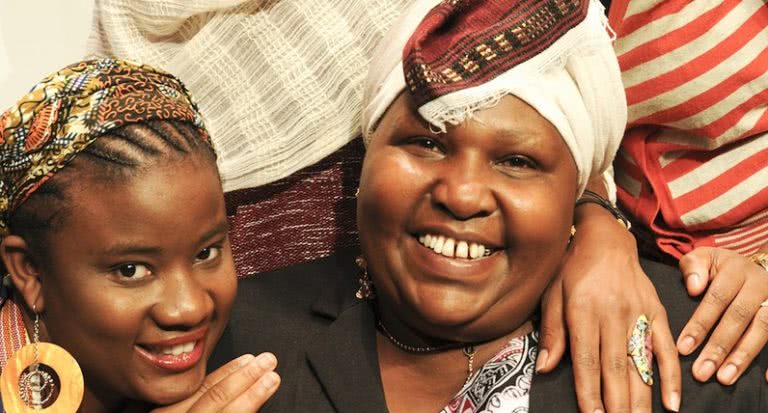In addition to having a delightfully odd title,The Baulkham Hills African Ladies Troupeis likely to be one of the most illuminating, if confronting productions you’ll come across in the next few months.
Relaunching at Parramatta’s Riverside Theatres and the Sydney Opera House before embarking on an international tour, the production recounts the harrowing yet humorous stories of four African women forced to flee the sexual, physical and psychological violence of their home countries and fashion a new life here in Australia. Writer/director Ros Horin recounts how despite the horror these women have faced, they still have the courage to share their stories onstage.
“It’s all about journeys, really,” Horin explains in a jovial, somewhat rushed voice. Since Horin is currently working 16-hour days, six days a week, it’s little wonder she sounds a touch frazzled. “It’s a journey from trauma towards healing and a new life in Australia. I think all the women have such amazing spirits – it is a celebration of their life force, of their energy, and you know, that’s where the humour comes from. You see this affirmation that, ‘I am still here, I have survived.’ These are tales being told by survivors – and often horrendous tales – but humour is one of the basic human tools for survival. Black humour, ironic humour, silly humour, whatever the form. I don’t think people can survive without it in some way. So it’s not forced humour, and these African women, in the same way a lot of indigenous women do, they have a kind of earthy, gutsy humour, which is just a part of who they are. But also because music, song and dance is such a part of their culture and everyday life, it bubbles up fairly naturally from who they are.”
The production, featuring Yarrie Bangura, Aminata Conteh-Biger, Yordanos Haile-Michael and Rosemary Kariuki-Fyfe, had its genesis in Horin’s investigation into the aftermath of trauma – how victims of violence and calamity go about rebuilding their sense of self; how they find the strength to live with such dark shadows. One of the great responsibilities she subsequently faced was how to shape the abundance of material into histories that told each woman’s story without losing the depth of their experiences.
“I interviewed each of them for many hours over a great length of time, so there is really a luminous amount of material. I guess it’s a kind of slow, multi-layered process. You start to find common threads, or threads that are really counterpoint, and work out the peaks and troughs from there. It eventually emerges. But it is rather like sculpting, where you start with a lot of marble and chip away, chip away until you reach something that feels like an essence. I would take material into the rehearsal room and we would try it out. On the floor you’d quickly see, ‘Well, that sounds good, that doesn’t.’ We’d improvise it again, and new little gems would emerge. So it’s very much a process of me being a kind of synthesiser, I suppose. A curator of memories and gestures that come from them.”
Complementing the four women onstage is a troupe of dancers, whose role is both performative and somewhat anthropological; they emerge from the stories as representations of certain themes, but also as extensions of the women’s own cultural practices and entertainments.
“The dancers emerge as aspects of the stories,” says Horin. “For instance, there’s a cleansing, healing dance, which from gestures of washing and cleaning evolves into a dance. It’s quite meaningful in the context, quite ritualistic in a way. In another context we have an absolute break-out, wild freedom dance, which is almost an African-styled disco or nightclub, an exuberant dance. One of the comic spots we have is an African quiz, where we interact with the audience and blow down the clichОs that Africa is only a place of dysfunction. We ask this question, ‘Do you think all Africans dance the same?’ And the answer of course is no way. The South Africans dance in huge bounds and leaps, the Congolese dance with their bums,” Horin laughs. “There’s one scene in the play where, having moved to Australia, the women are discussing what things they miss the most, and one of them is dancing. They reflect on how back home they all used to dance far beyond the regular events like weddings. But they would dance at funerals, at harvests, for childbirth. And so here we are certainly trying to express things through dance because it is meaningful, but also because it’s beautiful to watch.”
This upcoming season will be the second time Parramatta has been treated to the production, and Belvoir audiences were also fortunate enough to witness the show in 2013. The response from audiences and performers alike has been an incredibly moving experience, and it remains Horin’s enduring hope that those who see the play might find the inspiration to lead brighter lives as a result.
“We’ve had really strong responses, where people have come out feeling inspired and hopeful. You see in them this sense of, ‘My God, if these women have been through that and survived, what might be possible in my own life?’ People come out deeply moved, and we’re deeply thrilled because, well, while you’re making a work you just don’t know exactly what it’s going to do, but people are coming out feeling uplifted. And I do very much hope that continues.”
The Baulkham Hills African Ladies Troupeis playing atRiverside Theatres fromWednesday February 18 – Saturday February 21, tickets here.Also playing at the Studio, Sydney Opera House, Thursday March 26 – Sunday March 29, tickets here.


































